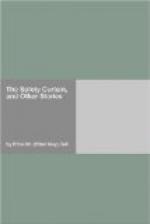“It isn’t meant for you surely!” he said.
Conyers laughed and got to his feet. “It isn’t much like me, is it?”
Hugh looked at him uncertainly. “I never noticed it before. It might have been you years ago.”
“Ah, perhaps,” said Conyers. “Why don’t you drink? I thought you were going to give me a toast.”
Hugh’s mood changed magically. He raised his glass high. “Here’s to your eternal welfare, dear fellow! I drink to your heart’s desire.”
Conyers waited till Hugh had drained his glass before he lifted his own.
Then, “I drink to the one woman,” he said, and emptied it at a draught.
* * * * *
The storm was over, and a horse’s feet clattered away into the darkness, mingling rhythmically with a cheery tenor voice.
In the room with the open door a man’s figure stood for a long while motionless.
When he moved at length it was to open the locked drawer of the writing-table. His right hand felt within it, closed upon something that lay there; and then he paused.
Several minutes crawled away.
From afar there came the long rumble of thunder. But it was not this that he heard as he stood wrestling with the fiercest temptation he had ever known.
Stiffly at last he stooped, peered into the drawer, finally closed it with an unfaltering hand. The struggle was over.
“For your sake, Damaris!” he said aloud, and he spoke without cynicism. “I should know how to wait by now—even for death—which is all I have to wait for.”
And with that he pulled the fluttering paper from the wall, crushed it in his hand, and went out heavily into the night.
FOOTNOTES:
[Footnote 1: This story was originally issued in the Red Magazine.]
The Eleventh Hour[2]
CHAPTER I
HIS OWN GROUND
“Oh, to be a farmer’s wife!”
Doris Elliot paused, punt-pole in hand, to look across a field of corn-sheaves with eyes of shining appreciation.
Her companion, stretched luxuriously on his back on a pile of cushions, smiled a contemplative smile and made no comment.
The girl’s look came down to him after a moment. She regarded him with friendly contempt.
“You’re very lazy, Hugh,” she said.
“I know it,” said Hugh Chesyl comfortably.
She dropped the pole into the water and drove the punt towards the bank. “It’s a pity you’re such a slacker,” she said.
He removed his cigarette momentarily. “You wouldn’t like me any better if I weren’t,” he said.
“Indeed I should—miles!”
“No, you wouldn’t.” His smile became more pronounced. “If I were more energetic, I should be for ever pestering you to marry me. And, you know, you wouldn’t like that. As it is, I take ‘No,’ for an answer and rest content.”




